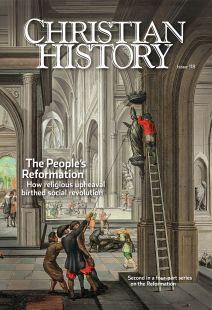Savonarola Raged Against Corruption at the Cost of His Life
WHEN Girolamo Savonarola was born in Ferrera, the moral landscape of Italy was as deplorable as it had been since the triumph of Christianity under Constantine. A series of degenerate popes set the tone by indulging in wastefulness, greed, murder, blasphemy, astrology, and sexual immorality. Princes and common folk followed suit.
Savonarola would become one of the greatest men of his age because he pushed back against those prevailing vices. As a boy, he was serious but reclusive, eager to learn, sharp and skilled in debate but known for gentleness in his dealings with others. His parents designated him to become a doctor, and he entered his studies with enthusiasm, although he was more eager to master the philosophies of Plato and Aristotle than medicine.
At the same time, the morose disposition for which he became known grew more pronounced. Horrified by the decadence around him, at twenty he wrote a poem titled “The Ruin of the World.” His unhappiness deepened when a girl he admired rejected him. When he was twenty-two, Savonarola heard a sermon that caused him to burn everything he had written on Plato. The tinsel of the rich and the enslavement of the poor caused him to quote lines from a play many times a day: “Ah! flee from this cruel land, flee from this covetous shore!” He prayed continually that Christ would deliver him from these prevailing sins and that God would lead him into the work he was to do.
Dedicating himself completely to Christ, he resolved to become a monk. In order that his departure would not be detected, for he loved his parents and feared they would talk him out of his resolution, he left home during the city’s gaudy festival in honor of St. George, held on April 24th that year. In his hand, he carried the family Bible. This day 25 April, 1475 found him in Bologna, where he asked for admittance to the Dominican order.
Savonarola became a monk, studied in Bologna, and then transferred to St. Mark’s in Florence. At first he preached messages that only the scholarly could understand, but gradually he developed a style that appealed to the masses. He uttered dark prophecies against Italy and earned the implacable hatred of Pope Alexander VI when he denounced his corruption and called upon Europe’s leaders to dethrone him. Huge audiences surged into his chapel.
In time Savonarola helped establish a republic in Florence. Surrounded by Dominicans who bullied the citizens, Savonarola and his followers burned the “vanities” of the city—art works and books. Savonarola had once remarked, “It would be good for religion if many books that seem useful were destroyed. When there were not so many books and not so many arguments and disputes, religion grew more quickly than it has since.” His followers would not even allow people to keep portraits of the deceased whom they had loved.
Poor policies led to shortages in Florence and the city ran out of money. Pope Alexander VI threatened an interdict. Some of Savonarola’s predictions failed. A Franciscan challenged Savonarola to an ordeal by fire and Domenico da Pescia accepted in Savonarola’s behalf.
Crowds gathered, but the Franciscan backed out. Cheated of their spectacle, the people blamed Savonarola. The next day he was arrested. For two months he was interrogated and tortured. Finally on 23 May, 1498, he was hanged and burned.
A curious event occurred at his execution. Scoffers had taunted him to work a miracle if he could. After he was dead, his hand flew up, two fingers extended, as if blessing the crowd. The superstitious onlookers panicked and turned to flee, trampling several children to death.
—Dan Graves
----- ----- -----
For an excerpt from Savonarola, see "Without God, a 'Broken Tool'"; he also appears in Christian History #118 The People's Reformation.






